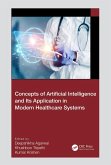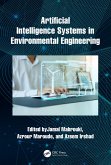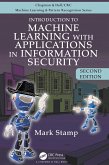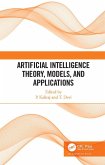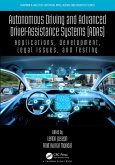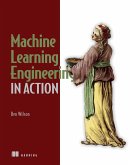Artificial Intelligence: A Guide to Intelligent Systems (eBook, ePUB)


Alle Infos zum eBook verschenken

Artificial Intelligence: A Guide to Intelligent Systems (eBook, ePUB)
- Format: ePub
- Merkliste
- Auf die Merkliste
- Bewerten Bewerten
- Teilen
- Produkt teilen
- Produkterinnerung
- Produkterinnerung

Hier können Sie sich einloggen

Bitte loggen Sie sich zunächst in Ihr Kundenkonto ein oder registrieren Sie sich bei bücher.de, um das eBook-Abo tolino select nutzen zu können.
What are the principles behind intelligent systems? How are they built? What are intelligent systems useful for? How do we choose the right tool for the job? These questions are answered by Michael Negnevitsky's Artificial Intelligence: A Guide to Intelligent Systems .
Unlike many books on computer intelligence, which use complex computer science terminology and are crowded with complex matrix algebra and differential equations, this text demonstrates that the ideas behind intelligent systems are simple and straightforward. This text assumes little or no programming experience as it tackles…mehr
- Geräte: eReader
- ohne Kopierschutz
- eBook Hilfe
- Größe: 61.09MB
![Concepts of Artificial Intelligence and its Application in Modern Healthcare Systems (eBook, ePUB) Concepts of Artificial Intelligence and its Application in Modern Healthcare Systems (eBook, ePUB)]() Concepts of Artificial Intelligence and its Application in Modern Healthcare Systems (eBook, ePUB)47,95 €
Concepts of Artificial Intelligence and its Application in Modern Healthcare Systems (eBook, ePUB)47,95 €![Artificial Intelligence Systems in Environmental Engineering (eBook, ePUB) Artificial Intelligence Systems in Environmental Engineering (eBook, ePUB)]() Artificial Intelligence Systems in Environmental Engineering (eBook, ePUB)51,95 €
Artificial Intelligence Systems in Environmental Engineering (eBook, ePUB)51,95 €![Introduction to Machine Learning with Applications in Information Security (eBook, ePUB) Introduction to Machine Learning with Applications in Information Security (eBook, ePUB)]() Mark StampIntroduction to Machine Learning with Applications in Information Security (eBook, ePUB)66,95 €
Mark StampIntroduction to Machine Learning with Applications in Information Security (eBook, ePUB)66,95 €![Artificial Intelligence Theory, Models, and Applications (eBook, ePUB) Artificial Intelligence Theory, Models, and Applications (eBook, ePUB)]() Artificial Intelligence Theory, Models, and Applications (eBook, ePUB)52,95 €
Artificial Intelligence Theory, Models, and Applications (eBook, ePUB)52,95 €![A Learner's Guide to Fuzzy Logic Systems, Second Edition (eBook, ePUB) A Learner's Guide to Fuzzy Logic Systems, Second Edition (eBook, ePUB)]() K. SundareswaranA Learner's Guide to Fuzzy Logic Systems, Second Edition (eBook, ePUB)22,95 €
K. SundareswaranA Learner's Guide to Fuzzy Logic Systems, Second Edition (eBook, ePUB)22,95 €![Autonomous Driving and Advanced Driver-Assistance Systems (ADAS) (eBook, ePUB) Autonomous Driving and Advanced Driver-Assistance Systems (ADAS) (eBook, ePUB)]() Autonomous Driving and Advanced Driver-Assistance Systems (ADAS) (eBook, ePUB)60,95 €
Autonomous Driving and Advanced Driver-Assistance Systems (ADAS) (eBook, ePUB)60,95 €![Machine Learning Engineering in Action (eBook, ePUB) Machine Learning Engineering in Action (eBook, ePUB)]() Ben WilsonMachine Learning Engineering in Action (eBook, ePUB)43,51 €
Ben WilsonMachine Learning Engineering in Action (eBook, ePUB)43,51 €-
-
-
Unlike many books on computer intelligence, which use complex computer science terminology and are crowded with complex matrix algebra and differential equations, this text demonstrates that the ideas behind intelligent systems are simple and straightforward. This text assumes little or no programming experience as it tackles topics like expert systems, fuzzy systems, artificial neural networks, evolutionary computation, knowledge engineering, and data mining.
Dieser Download kann aus rechtlichen Gründen nur mit Rechnungsadresse in A, B, BG, CY, CZ, D, DK, EW, E, FIN, F, GR, HR, H, IRL, I, LT, L, LR, M, NL, PL, P, R, S, SLO, SK ausgeliefert werden.
- Produktdetails
- Verlag: Pearson HigherEducation
- Altersempfehlung: ab 18 Jahre
- Erscheinungstermin: 7. November 2024
- Englisch
- ISBN-13: 9781292730844
- Artikelnr.: 72263706
- Verlag: Pearson HigherEducation
- Altersempfehlung: ab 18 Jahre
- Erscheinungstermin: 7. November 2024
- Englisch
- ISBN-13: 9781292730844
- Artikelnr.: 72263706
- Herstellerkennzeichnung Die Herstellerinformationen sind derzeit nicht verfügbar.
o 1.1 Intelligent Machines, or What Machines Can Do
o 1.2 The History of Artificial Intelligence, or From the Dark
Ages to Knowledge-based Systems
o 1.3 Generative AI
o 1.4 Summary
o Questions for Review
o References
2. Expert Systems
o 2.1 Introduction, or Knowledge Representation Using Rules
o 2.2 The Main Players in the Expert System Development Team
o 2.3 Structure of a Rule-based Expert System
o 2.4 Fundamental characteristics of an expert system
o 2.5 Forward Chaining and Backward Chaining Inference Techniques
o 2.6 MEDIA ADVISOR: A Demonstration Rule-based Expert System
o 2.7 Conflict Resolution
o 2.8 Uncertainty Management in Rule-based Expert Systems
o 2.9 Advantages and Disadvantages of Rule-based Expert systems
o 2.10 Summary
o Questions for Review
o References
3. Fuzzy Systems
o 3.1 Introduction, or What Is Fuzzy Thinking?
o 3.2 Fuzzy Sets
o 3.3 Linguistic Variables and Hedges
o 3.4 Operations of Fuzzy Sets
o 3.6 Fuzzy Inference
o 3.7 Building a Fuzzy Expert System
o 3.8 Summary
o Questions for Review
o References
4. Frame-based Systems and Semantic Networks
o 4.1 Introduction, or What Is a Frame?
o 4.2 Frames as a Knowledge Representation Technique
o 4.3 Inheritance in Frame-based Systems
o 4.4 Methods and Demons
o 4.5 Interaction of Frames and Rules
o 4.6 Buy Smart: A Frame-based Expert System
o 4.7 The Web of Data
o 4.8 RDF Resource Description Framework and RDF Triples
o 4.9 Turtle, RDF Schema and OWL
o 4.10 Querying the Semantic Web with SPARQL
o 4.11 Summary
o Questions for Review
o References
5. Artificial Neural Networks
o 5.1 Introduction, or How the Brain Works
o 5.2 The Neuron as a Simple Computing Element
o 5.3 The Perceptron
o 5.4 Multilayer Neural Networks
o 5.5 Accelerated Learning in Multilayer Neural Networks
o 5.6 The Hopfield Network
o 5.7 Bidirectional Associative Memory
o 5.8 Self-organising Neural Networks
o 5.9 Reinforcement Learning
o 5.10 Summary
o Questions for Review
o References
6. Deep Learning and Convolutional Neural Networks
o 6.1 Introduction, or How Deep Is a Deep Neural Network?
o 6.2 Image Recognition or How Machines See the World
o 6.3 Convolution in Machine Learning
o 6.4 Activation Functions in Deep Neural Networks
o 6.5 Convolutional Neural Networks
o 6.6 Back-propagation Learning in Convolutional Networks
o 6.7 Batch Normalisation
o 6.8 Summary
o Questions for Review
o References
7. Evolutionary Computation
o 7.1 Introduction, or Can Evolution Be Intelligent?
o 7.2 Simulation of Natural Evolution
o 7.3 Genetic Algorithms
o 7.4 Why Genetic Algorithms Work
o 7.5 Maintenance Scheduling with Genetic Algorithms
o 7.6 Genetic Programming
o 7.7 Evolution Strategies
o 7.8 Ant Colony Optimisation
o 7.9 Particle Swarm Optimisation
o 7.10 Summary
o Questions for Review
o References
8. Hybrid Intelligent Systems
o 8.1 Introduction, or How to Combine German Mechanics with
Italian Love
o 8.2 Neural Expert Systems
o 8.3 Neuro-Fuzzy Systems
o 8.4 ANFIS: Adaptive Neuro-Fuzzy Inference System
o 8.5 Evolutionary Neural Networks
o 8.6 Fuzzy Evolutionary Systems
o 8.7 Summary
o Questions for Review
o References
9. Knowledge Engineering
o 9.1 Introduction, or What Is Knowledge Engineering?
o 9.2 Will an Expert System Work for My Problem?
o 9.3 Will a Fuzzy Expert System Work for My Problem?
o 9.4 Will a Neural Network Work for My Problem?
o 9.5 Will a Deep Neural Network Work for My Problem?
o 9.6 Will Genetic Algorithms Work for My Problem?
o 9.7 Will Particle Swarm Optimisation Work for My Problem?
o 9.8 Will a Hybrid Intelligent System Work for My Problem?
o 9.9 Summary
o Questions for Review
o References
10. Data Mining and Knowledge Discovery
o 10.1 Introduction, or What Is Data Mining?
o 10.2 Statistical Methods and Data Visualisation
o 10.3 Principal Components Analysis
o 10.4 Relational Databases and Database Queries
o 10.5 The Data Warehouse and Multidimensional Data Analysis
o 10.6 Decision Trees
o 10.7 Association Rules and Market Basket Analysis
o 10.8 Summary
o Questions for Review
o References
* Glossary
* Index
o 1.1 Intelligent Machines, or What Machines Can Do
o 1.2 The History of Artificial Intelligence, or From the Dark
Ages to Knowledge-based Systems
o 1.3 Generative AI
o 1.4 Summary
o Questions for Review
o References
2. Expert Systems
o 2.1 Introduction, or Knowledge Representation Using Rules
o 2.2 The Main Players in the Expert System Development Team
o 2.3 Structure of a Rule-based Expert System
o 2.4 Fundamental characteristics of an expert system
o 2.5 Forward Chaining and Backward Chaining Inference Techniques
o 2.6 MEDIA ADVISOR: A Demonstration Rule-based Expert System
o 2.7 Conflict Resolution
o 2.8 Uncertainty Management in Rule-based Expert Systems
o 2.9 Advantages and Disadvantages of Rule-based Expert systems
o 2.10 Summary
o Questions for Review
o References
3. Fuzzy Systems
o 3.1 Introduction, or What Is Fuzzy Thinking?
o 3.2 Fuzzy Sets
o 3.3 Linguistic Variables and Hedges
o 3.4 Operations of Fuzzy Sets
o 3.6 Fuzzy Inference
o 3.7 Building a Fuzzy Expert System
o 3.8 Summary
o Questions for Review
o References
4. Frame-based Systems and Semantic Networks
o 4.1 Introduction, or What Is a Frame?
o 4.2 Frames as a Knowledge Representation Technique
o 4.3 Inheritance in Frame-based Systems
o 4.4 Methods and Demons
o 4.5 Interaction of Frames and Rules
o 4.6 Buy Smart: A Frame-based Expert System
o 4.7 The Web of Data
o 4.8 RDF Resource Description Framework and RDF Triples
o 4.9 Turtle, RDF Schema and OWL
o 4.10 Querying the Semantic Web with SPARQL
o 4.11 Summary
o Questions for Review
o References
5. Artificial Neural Networks
o 5.1 Introduction, or How the Brain Works
o 5.2 The Neuron as a Simple Computing Element
o 5.3 The Perceptron
o 5.4 Multilayer Neural Networks
o 5.5 Accelerated Learning in Multilayer Neural Networks
o 5.6 The Hopfield Network
o 5.7 Bidirectional Associative Memory
o 5.8 Self-organising Neural Networks
o 5.9 Reinforcement Learning
o 5.10 Summary
o Questions for Review
o References
6. Deep Learning and Convolutional Neural Networks
o 6.1 Introduction, or How Deep Is a Deep Neural Network?
o 6.2 Image Recognition or How Machines See the World
o 6.3 Convolution in Machine Learning
o 6.4 Activation Functions in Deep Neural Networks
o 6.5 Convolutional Neural Networks
o 6.6 Back-propagation Learning in Convolutional Networks
o 6.7 Batch Normalisation
o 6.8 Summary
o Questions for Review
o References
7. Evolutionary Computation
o 7.1 Introduction, or Can Evolution Be Intelligent?
o 7.2 Simulation of Natural Evolution
o 7.3 Genetic Algorithms
o 7.4 Why Genetic Algorithms Work
o 7.5 Maintenance Scheduling with Genetic Algorithms
o 7.6 Genetic Programming
o 7.7 Evolution Strategies
o 7.8 Ant Colony Optimisation
o 7.9 Particle Swarm Optimisation
o 7.10 Summary
o Questions for Review
o References
8. Hybrid Intelligent Systems
o 8.1 Introduction, or How to Combine German Mechanics with
Italian Love
o 8.2 Neural Expert Systems
o 8.3 Neuro-Fuzzy Systems
o 8.4 ANFIS: Adaptive Neuro-Fuzzy Inference System
o 8.5 Evolutionary Neural Networks
o 8.6 Fuzzy Evolutionary Systems
o 8.7 Summary
o Questions for Review
o References
9. Knowledge Engineering
o 9.1 Introduction, or What Is Knowledge Engineering?
o 9.2 Will an Expert System Work for My Problem?
o 9.3 Will a Fuzzy Expert System Work for My Problem?
o 9.4 Will a Neural Network Work for My Problem?
o 9.5 Will a Deep Neural Network Work for My Problem?
o 9.6 Will Genetic Algorithms Work for My Problem?
o 9.7 Will Particle Swarm Optimisation Work for My Problem?
o 9.8 Will a Hybrid Intelligent System Work for My Problem?
o 9.9 Summary
o Questions for Review
o References
10. Data Mining and Knowledge Discovery
o 10.1 Introduction, or What Is Data Mining?
o 10.2 Statistical Methods and Data Visualisation
o 10.3 Principal Components Analysis
o 10.4 Relational Databases and Database Queries
o 10.5 The Data Warehouse and Multidimensional Data Analysis
o 10.6 Decision Trees
o 10.7 Association Rules and Market Basket Analysis
o 10.8 Summary
o Questions for Review
o References
* Glossary
* Index

